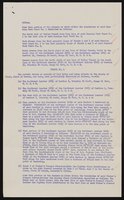Search the Special Collections and Archives Portal
Search Results

Alan Stock oral history interview: transcript
Date
Archival Collection
Description
Oral history interview with Alan Stock conducted by Barbara Tabach on December 27, 2017 for the Remembering 1 October Oral History Project. In this interview, Alan Stock discusses moving to Las Vegas, Nevada in 1999 for his job as a radio talk show host for KXNT. Stock describes the broadcast that covered the October 1, 2017 Las Vegas mass shooting from 11 PM on that night until 9 AM the next morning. He talks about some of the calls the station received from various members of the community, including survivors of the shooting, families of those at the event, people on lockdown in the nearby hotels, doctors, and general listeners. Stock describes some of the topics discussed on the broadcast, such as what was currently happening on the Las Vegas Strip, stories of the aftermath, and the support needed from the general public. Other topics include gun control and conspiracy theories. He discusses the impact this and other shootings would have on public affairs, including tighter security in daily living and public gatherings. He compares security in the United States to security in Israel and other countries, focusing on the idea of unconcealed guns worn in public. Throughout this interview, Alan Stock explains that the radio station's goal was to provide accurate information to the public during the aftermath of the October 1, 2017 mass shooting.
Text

Transcript of interview with Peggy Huber by Greg Pushard, March 14, 1981
Date
Archival Collection
Description
On March 14th, 1981, collector Greg Pushard interviewed postmaster Peggy Huber (born March 31st, 1884 in Conway, Arkansas) in her home in Las Vegas, Nevada. This interview covers Peggy’s life in Nevada and also offers an insightful overview of Nevada’s rich history. During this interview Peggy discusses life on the ranch, mining, settlement, and the local early aboveground atomic blasts.
Text
Mollie Gregory Collection of Oral Histories
Identifier
Abstract
The Mollie Gregory Collection of Oral Histories contains audio interviews and brief transcripts that focus on welfare, family, and women's issues in Nevada from 1970 to 1974. Gregory interviewed Nevada residents including Maya Miller, Ruby Duncan, and Mary Wesley, who described their lives during the anti-poverty and women's rights campaigns in the early 1970s. The collection documents views on welfare; the Equal Rights Amendment; race, discrimination, and civil rights; and political campaigns.
Archival Collection
University of Nevada, Las Vegas Photograph Collection
Identifier
Abstract
The University of Nevada, Las Vegas Photograph Collection (approximately 1900-2004) depicts the development of the university and the city of Las Vegas. The collection includes images of campus buildings, student activities, sports teams, past university presidents, and Las Vegas in the early twentieth century. Early images depicting the surrounding area are included in this collection as well.
Archival Collection
Penelope Ruchman Collection of Las Vegas, Nevada Casino Professionals Oral Histories
Identifier
Abstract
The Penelope Ruchman Collection of Las Vegas, Nevada Casino Professionals Oral Histories includes interviews conducted by Ruchman from approximately 1999 to 2001 of casino industry workers who worked in Las Vegas, Nevada. The majority of interviews were conducted by Ruchman in their office at Gambler's Book Shop (GBS), but some where conducted in interviewee's homes and offices, or over the phone. The collection represents Ruchman's efforts to interview and document a generation of early casino industry workers that were quickly aging. The project was intended to be compiled as a definitive history of Las Vegas and American gambling, entitled "After the Gold Rush." The project was permanently postponed in the fall of 2001 when Ruchman left GBS to work for Park Place Entertainment as a corporate business and operations analyst, and later as casino operations director for Caesars Palace. Not all interviews have digital transcripts available.
Archival Collection
Alice P. Broudy Papers on Broudy v. United States
Identifier
Abstract
The Alice P. Broudy Papers on Broudy v United States (1940-2018) comprise materials collected and created by the wife of Charles A. Broudy during her effort to obtain compensation for his death in 1977, which she believed to be a result of repeated radiation exposure. Materials include government documents obtained through the Freedom of Information Act (FOIA), correspondence, memos, litigation papers, scholarly reports and articles on radiation exposure and its effects, congressional testimony, speeches, newspaper clippings, books and audiovisual materials. Also included are photographs, slides, and one box of Alice "Pat" Broudy's personal papers. There are two boxes of papers that remain unprocessed.
Archival Collection
Samuel Liddle General Store Records
Identifier
Abstract
The Samuel Liddle General Store Records (1885-1887) are comprised of order forms, inventories, and customer ledgers for Liddle's General Store in Leadville, Nevada. The store was created to provide services to residents and prospectors during a mining boom in White Pine County that lasted from 1887 to approximately 1890. The materials also consist of Liddle's General Store accounts, business correspondence, and transactions, such as wholesale purchases of general merchandise and mining supplies from vendors in Eureka, Nevada, San Francisco, California, and smaller nearby locations. An undated hand-drawn map of the townsite is also included.
Archival Collection
Jacob E. Von Tobel Photograph Collection
Identifier
Abstract
The Jacob E. Von Tobel Photograph Collection contains black-and-white photographs of the pioneer Von Tobel family from 1900 to 1980. The collection includes photographs of the Von Tobel family, early Las Vegas, Nevada buildings and landmarks, and aerial photographs of Las Vegas and surrounding areas.
Archival Collection


